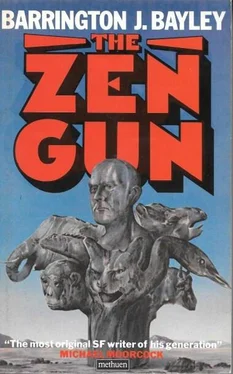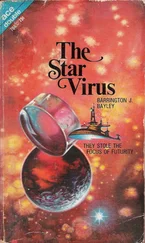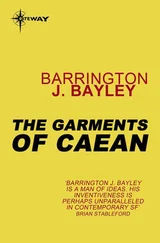Barrington J. Bayley
THE ZEN GUN
Around the blue, green and white planet, Ten-Fleet disposed itself with a suddenness that was intentionally frightening. On the diagrammatisation screens in the control centres of both sides, the criss-cross orbits of the hundred and forty ships resembled the electrons of a heavy atom orbiting an engorged nucleus like an enclosing web. In the first seconds of the occupation the planet’s own service satellites, a gnat’s haze, had been vapourised, the staffs of a dozen manned stations taken prisoner. Robbed of communications, the planet was helpless and nearly blind.
Meantime Ten-Fleet substituted its own satellite haze. Everything on and below the surface was being monitored at a resolution level of one to one.
Relaxing in his den, Admiral Archier could imagine the consternation now reigning on the planet. Its government would be ignorant—or so he hoped—of what he as a military man understood all too well, namely that to be in a position to blast a planet by missile, beam or blanket was merely an exercise in military impotence. The criterion of practical power was the capability to land effectives, and just as important, to take them off again.
Ten-Fleet was depleted. If it came to it, Archier would not properly be able to administrate the cowering population. Its dreadful weaponry was, in that sense, a threat that could be bluffed.
It was advisable, therefore, to conduct his business quickly, before the government down below began to draw conclusions from the fleet’s inaction. The Admiral did not relish having to make a decision as to whether to punish the planet for recalcitrance.
Archier reclined on a mossy bank in the shade of an apple tree. Animals played and gambolled a short distance away: a dwarf elephant two feet tall; a dwarf giraffe whose head could crane almost to Archier’s shoulder; a chimp, and a bush baby almost as large.
Disengaging itself, the elephant strolled over, “The ruling council is in debate right now,” it announced in a slightly trumpety voice. “According to bounce-back satellite reports, they are talking over ways to cheat us.”
Archier smiled. “No doubt they think they can pass off decorticated murderers as artistic geniuses. Well, we’ve seen all that before.”
The giraffe ambled over to rub its neck against his sleeve. “I hope they give us a good composer,” he said in his soft, mild voice. “Would we be allowed to commission him before we make delivery to Diadem?”
“While we are in semi-autonomous status, yes.”
“Admiral, they are asking to talk to us,” the elephant chimed in.
Archier nodded. He patted the large grey head of his elephant adjutant, whose brain implant kept it in touch with all of Ten-Fleet’s communications. “Come with me then, Arctus. I might need you to keep me informed.”
From his present vantage point the mossy wood had no visible limits. But when Archier stepped behind the apple tree to stroll through the dappled light of the grove, Arctus padding along behind him, he was suddenly in a wide, carpeted corridor bearing a steady traffic of men, women, children and animals. A short walk brought him to the official audience chamber. A spider monkey looked up and lifted a hand in salute. Then it began to set up the meeting.
Admiral Archier took his cloak of rank from a nearby peg and self-consciously seated himself upon the throne before the view area. Subdued lights came on. He felt the mantle of imperial numinousness descend upon him. To those whose images now sprang to life in the view area his clean, pale features would seem majestic and almost angelically authoritative, and the glint in his eye would betoken a chilling perceptiveness.
He was looking into a council chamber. About twenty people sat around an oval table; there were no animals present. At the head of the table, raised a little above the others, was the Chairman of the Rostian Council, an elderly man who bore his years well, and who wore a white gown that made him look almost clinical. A short and neatly trimmed white beard sprouted from his chin.
The Chairman was the only one able to look directly at Archier without having to turn his head. The expression on his face was that of one who knew the weakness of his position and was forcing himself to bite back heartfelt defiance.
“Do I address the representative of the Imperial Directors?” he asked in a dry, acid tone.
“You do, but more specifically the Imperial Collector of Taxes,” Archier answered lightly. “As already stated, you are twenty standard years in default. The matter is serious; your account must be settled forthwith.”
“We are not wilfully in default,” the Chairman said with steely grimness. “Ten years ago we offered to render all due services in credit, manufactured goods or rare materials. We received no reply.”
“I am your reply. Your offer should not have been made. It bodes the Empire no service and is interpreted as attempted evasion of payment.” Archier reached out his hand; the spider monkey placed a file of papers on it. “However, to clear the matter up, the Imperial Inspector of Revenues has agreed to reduce arrears by fifty per cent—on condition that all future levies are paid promptly at the stipulated ten-standard-year intervals, delivery being your responsibility.”
The Admiral bent his head to the papers before him. “These are the levies which will now be paid by you before we depart.”
He began to read from a list. “One thousand two hundred and fifty-eight artists of the musical variety, comprising both composers and performers.
“One thousand two hundred and fifty-eight artists of the visual, tactile and odoriferous varieties.
“One thousand two hundred and fifty-eight practitioners of literary and dramatic arts.
“Two thousand and twenty scientists of assorted disciplines.
“You are reminded that all persons must be human, not animal or construct, containing not more than two per cent of dominant animal genes. All persons must reach at least Grade Twenty on the Carrimer Creativity Test that will be applied by Fleet psychologists. Further, at least one hundred persons should be of genius standard, or Grade Twenty-Five on the Carrimer Test.”
Archier looked up and handed back the file to the spider monkey. The faces staring at him could only be described as stony.
Oh, I know that you’re thinking. We would rather secede from the Empire, that’s what you’re thinking. But you dare not speak of rebellion, not openly, not even here on the fringe, while Ten-Fleet sweeps over your heads .
“This traffic in people goes quite against the social philosophy we have evolved here on Rostia!” the Chairman protested. “It is slavery!”
“Do not despair, the cream of your nation will be exporting that philosophy into the Empire generally,” Archier retorted amiably. “Your reluctance is a sad state of affairs. There was a time when the gifted among us competed for a chance to migrate to the heart of the Empire.”
“Were that so, this tribute would hardly be necessary.”
Archier leaned forward. “You have told me what you do not like. There is something I do not like. I do not like the word ‘tribute.’ I am here as a tax-gatherer. We all live under the law. Make arrangements for payment.”
The Chairman bit his lip. “We shall need time if we are to do this. You come upon us suddenly.”
“We shall not brook any delay. We shall know if you stall for time or plot any trickery against us. Therefore, I call on you to reassert your allegiance to the Empire.” At this moment Archier became aware that Arctus the elephant was tugging at his sleeve with its trunk. He leaned aside. “What is it, Arctus?” he muttered.
Читать дальше












